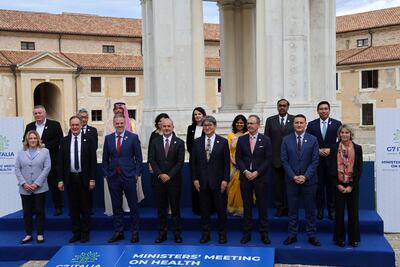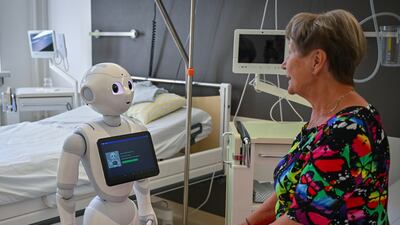The G7 countries threw their support behind using artificial intelligence in health care on Friday, saying the technology should be deployed “to its full potential” in diagnosing illnesses, recommending treatments and developing new medicines.
Health ministers from Britain, France, Germany, Italy, the US, Canada and Japan said using AI was a “major opportunity” amid “growing evidence” it can help guide doctors' decision-making and their relationship with patients.
The ministers said the first task was to gather data on patients to be processed by AI algorithms, in a way that “respects security and privacy”. They acknowledged this would come with “technical and cultural challenges” over trust in the technology.
“AI should not be feared or opposed”, Italy's Health Minister Orazio Schillaci said after two-day health talks in Ancona involving guest countries including Saudi Arabia and Albania. He said the technology had already begun to change medicine and improve diagnostics and therapy.
“Prevention and innovation are the keys for a healthier future, for a new spring in life where technology and health go hand in hand,” Mr Schillaci said. “We have to have an ethical approach towards it, and remember that no technology can replace human actions and decision.”
A five-page paper adopted by the seven countries said AI's uses could include combing through medical papers, speeding up drug development, reducing errors, improving diagnosis, planning treatment, freeing up doctors to spend more time with patients, and warding off malware and cyber attacks on hospitals.
It said AI could usher in “personalised medicine” by giving patients greater insights into their individual conditions. The idea of giving people an AI-powered “digital twin” has gained traction among researchers, corporations such as Nokia and Siemens, and Saudi Arabia’s futuristic megacity Neom, among others.
Doctors in the UAE have used AI to improve success rates for IVF. Trainee eye doctors were outsmarted by ChatGPT in a study published in April. Britain this week announced funding for a promising AI-assisted blood test that could detect 12 cancers.
However, the G7 paper said a “digital gap” was likely to emerge between doctors and patients due to “poor knowledge” of rapidly changing technology, a “lack of understanding” of AI applications and a lack of incentives to use them.
Security risks
Ministers said human oversight of AI “remains a key consideration”. They warned of risks including cyber crime and the possibility of an algorithm making an error, raising questions about liability and patient consent.
They said algorithms must be trained on data that represents the whole population they will be used on, or else there could be “discriminatory biases” such as those observed in AI language models. This means “comprehensive and fit-for-use data” is needed, they said.
Although patients and doctors “must remain central to medical decisions”, regulations should not be “unduly complex”, the ministers said as they called for a shift to a pro-AI “cultural mindset”. “As G7 member states, we express our determination to promote the use of AI in health care to its full potential,” they said.
Several of the G7 countries have ageing populations and face ballooning welfare costs as a result. Britain's Labour government is looking at expanding the use of private providers in its state-funded National Health Service.
A British group called the Independent Healthcare Providers Network has called on the NHS to “make much greater use of the private sector” to build treatment facilities for cancer, surgery and diagnostic care.
Our legal consultant
Name: Hassan Mohsen Elhais
Position: legal consultant with Al Rowaad Advocates and Legal Consultants
'Nope'
%3Cp%3E%3Cstrong%3EDirector%3A%3C%2Fstrong%3E%20Jordan%20Peele%0D%3Cbr%3E%3Cstrong%3EStars%3A%3C%2Fstrong%3E%20Daniel%20Kaluuya%2C%20Keke%20Palmer%2C%20Brandon%20Perea%2C%20Steven%20Yeun%0D%3Cbr%3E%3Cstrong%3ERating%3A%3C%2Fstrong%3E%203.5%2F5%3C%2Fp%3E%0A
Company%20profile
%3Cp%3E%3Cstrong%3EName%3A%3C%2Fstrong%3E%20WonderTree%3Cbr%3E%3Cstrong%3EStarted%3A%3C%2Fstrong%3E%20April%202016%3Cbr%3E%3Cstrong%3ECo-founders%3A%3C%2Fstrong%3E%20Muhammad%20Waqas%20and%20Muhammad%20Usman%3Cbr%3E%3Cstrong%3EBased%3A%3C%2Fstrong%3E%20Karachi%2C%20Pakistan%2C%20Abu%20Dhabi%2C%20UAE%2C%20and%20Delaware%2C%20US%3Cbr%3E%3Cstrong%3ESector%3A%3C%2Fstrong%3E%20Special%20education%2C%20education%20technology%2C%20assistive%20technology%2C%20augmented%20reality%3Cbr%3EN%3Cstrong%3Eumber%20of%20staff%3A%20%3C%2Fstrong%3E16%3Cbr%3E%3Cstrong%3EInvestment%20stage%3A%20%3C%2Fstrong%3EGrowth%3Cbr%3E%3Cstrong%3EInvestors%3A%3C%2Fstrong%3E%20Grants%20from%20the%20Lego%20Foundation%2C%20UAE's%20Anjal%20Z%2C%20Unicef%2C%20Pakistan's%20Ignite%20National%20Technology%20Fund%3C%2Fp%3E%0A
FIGHT%20CARD
%3Cp%3E%3Cstrong%3EFeatherweight%204%20rounds%3A%3C%2Fstrong%3E%3Cbr%3EYousuf%20Ali%20(2-0-0)%20(win-loss-draw)%20v%20Alex%20Semugenyi%20(0-1-0)%3Cbr%3E%3Cstrong%3EWelterweight%206%20rounds%3A%3C%2Fstrong%3E%3Cbr%3EBenyamin%20Moradzadeh%20(0-0-0)%20v%20Rohit%20Chaudhary%20(4-0-2)%3Cbr%3E%3Cstrong%3EHeavyweight%204%20rounds%3A%3C%2Fstrong%3E%3Cbr%3EYoussef%20Karrar%20(1-0-0)%20v%20Muhammad%20Muzeei%20(0-0-0)%3Cbr%3E%3Cstrong%3EWelterweight%206%20rounds%3A%3C%2Fstrong%3E%3Cbr%3EMarwan%20Mohamad%20Madboly%20(2-0-0)%20v%20Sheldon%20Schultz%20(4-4-0)%3Cbr%3E%3Cstrong%3ESuper%20featherweight%208%20rounds%3A%3C%2Fstrong%3E%3Cbr%3EBishara%20Sabbar%20(6-0-0)%20v%20Mohammed%20Azahar%20(8-5-1)%3Cbr%3E%3Cstrong%3ECruiseweight%208%20rounds%3A%3C%2Fstrong%3E%3Cbr%3EMohammed%20Bekdash%20(25-0-0)%20v%20Musa%20N%E2%80%99tege%20(8-4-0)%3Cbr%3E%3Cstrong%3ESuper%20flyweight%2010%20rounds%3A%3C%2Fstrong%3E%3Cbr%3ESultan%20Al%20Nuaimi%20(9-0-0)%20v%20Jemsi%20Kibazange%20(18-6-2)%3Cbr%3E%3Cstrong%3ELightweight%2010%20rounds%3A%3C%2Fstrong%3E%3Cbr%3EBader%20Samreen%20(8-0-0)%20v%20Jose%20Paez%20Gonzales%20(16-2-2-)%3C%2Fp%3E%0A
RESULTS
6.30pm: Maiden Dh165,000 (Dirt) 1,200
Winner: Miqyaas, Adrie de Vries (jockey), Rashed Bouresly (trainer).
7.05pm: Handicap Dh165,000 (D) 1,600m
Winner: Untold Secret, Xavier Ziani, Salem bin Ghadayer.
7.40pm: Maiden Dh165,000 (D) 1,600m
Winner: Shanty Star, Fabrice Veron, Rashed Bouresly.
8.15pm: Handicap Dh190,000 (D) 1,600m
Winner: Alkaamel, Antonio Fresu, Musabah Al Muhairi.
8.50pm: Handicap Dh175,000 (D) 1,400m
Winner: Speedy Move, Richard Mullen, Satish Seemar.
9.25pm: Handicap Dh175,000 (D) 2,000m
Winner: Quartier Francois, Fernando Jara, Ali Rashid Al Raihe.
It Was Just an Accident
Director: Jafar Panahi
Stars: Vahid Mobasseri, Mariam Afshari, Ebrahim Azizi, Hadis Pakbaten, Majid Panahi, Mohamad Ali Elyasmehr
Rating: 4/5
Our legal columnist
Name: Yousef Al Bahar
Advocate at Al Bahar & Associate Advocates and Legal Consultants, established in 1994
Education: Mr Al Bahar was born in 1979 and graduated in 2008 from the Judicial Institute. He took after his father, who was one of the first Emirati lawyers
Specs%20
%3Cp%3E%3Cstrong%3EPower%20train%3A%20%3C%2Fstrong%3E4.0-litre%20twin-turbo%20V8%20and%20synchronous%20electric%20motor%3Cbr%3E%3Cstrong%3EMax%20power%3A%20%3C%2Fstrong%3E800hp%3Cbr%3E%3Cstrong%3EMax%20torque%3A%20%3C%2Fstrong%3E950Nm%3Cbr%3E%3Cstrong%3ETransmission%3A%20%3C%2Fstrong%3EEight-speed%20auto%3Cbr%3E%3Cstrong%3EBattery%3A%20%3C%2Fstrong%3E25.7kWh%20lithium-ion%3Cbr%3E0-100km%2Fh%3A%203.4sec%3Cbr%3E0-200km%2Fh%3A%2011.4sec%3Cbr%3E%3Cstrong%3ETop%20speed%3A%20%3C%2Fstrong%3E312km%2Fh%3Cbr%3E%3Cstrong%3EMax%20electric-only%20range%3A%3C%2Fstrong%3E%2060km%20(claimed)%3Cbr%3E%3Cstrong%3EOn%20sale%3A%3C%2Fstrong%3E%20Q3%3Cbr%3E%3Cstrong%3EPrice%3A%20%3C%2Fstrong%3EFrom%20Dh1.2m%20(estimate)%3Cbr%3E%3Cbr%3E%3C%2Fp%3E%0A



